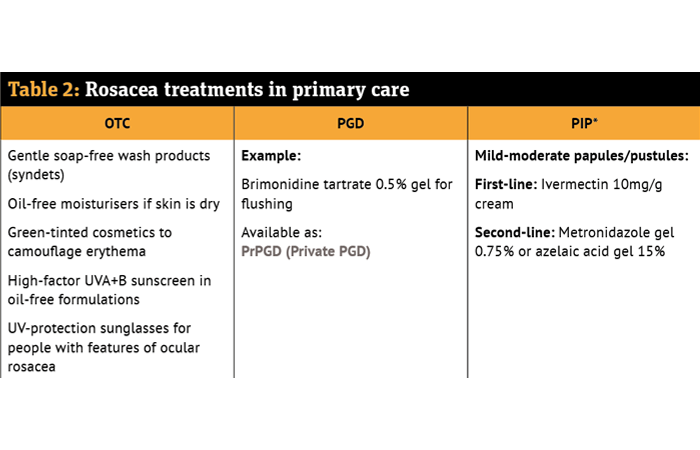Rosacea
Although previously known as ‘acne rosacea’, rosacea is different from acne and is not associated with the presence of comedones. It is a chronic inflammatory skin condition associated with recurrent episodes of facial flushing, persistent erythema, telangiectasia, papules and pustules.
The eyes may also be affected (ocular rosacea) and (rarely) rhinophyma (an enlarged nose), which occurs almost exclusively in men.
It affects about 5 per cent of the population, mainly in the 30-50-year age group. Some find the facial redness embarrassing and distressing, which can lead to anxiety and depression.
The cause of rosacea is unknown. High levels of facial skin-dwelling Demodex folliculorum mites are thought to play a role in some patients. A number of factors can trigger or worsen rosacea (e.g. hot or cold environments, spicy foods, hot drinks, alcohol, photosensitivity/sun exposure, stress and some drugs [e.g. calcium channel blockers, topical corticosteroids]).
See NICE CKS for full details (cks.nice.org.uk/topics/rosacea).

When to refer
Refer to GP/GP with extended role (GPwER) in dermatology (or pharmacist independent prescriber if appropriate) individuals with/where:
- Severe or persistent disease that has not responded to optimal management in primary care
- Serious eye problems associated with rosacea
- Rosacea of any severity associated with psychological distress or a mental health disorder
- There is diagnostic uncertainty.
Key points for rosacea patients
- Identifying and avoiding triggers is an important step in self-management
- OTC products (wash products, oil-free moisturisers) can be helpful (e.g. for managing sensitive skin)
- Topical brimonidine can be used once a day. It peaks at three to six hours, so consider timing application if needed for an evening event
- Topical ivermectin may cause transient aggravation of rosacea, which usually resolves within one week of continued treatment
- Self-referral to Changing Faces may be helpful for general support and learning to use camouflage make-up correctly.
